Sir John Monash, Personal Files Book 1, 5 November - 15 December 1914 - Part 6
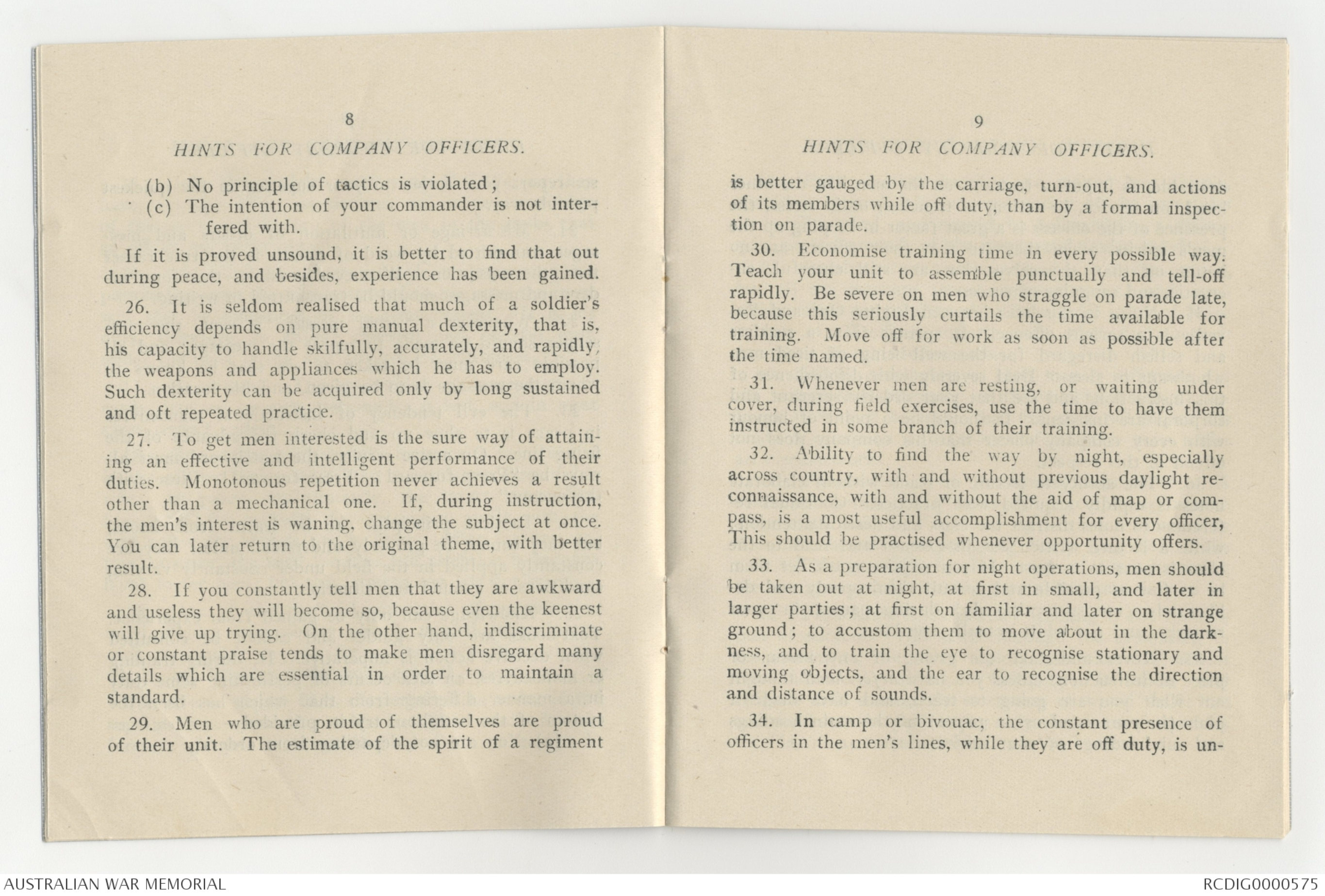
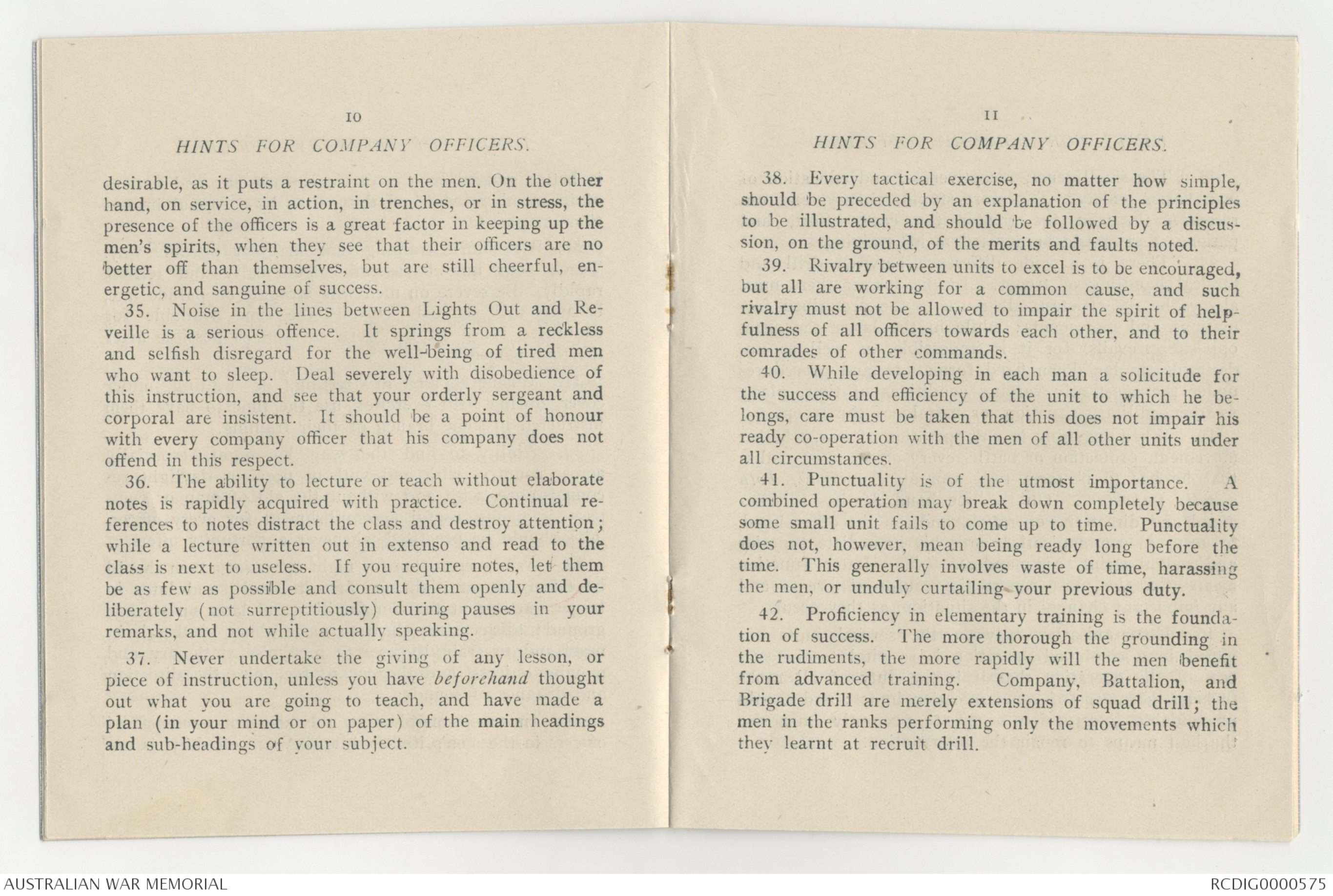
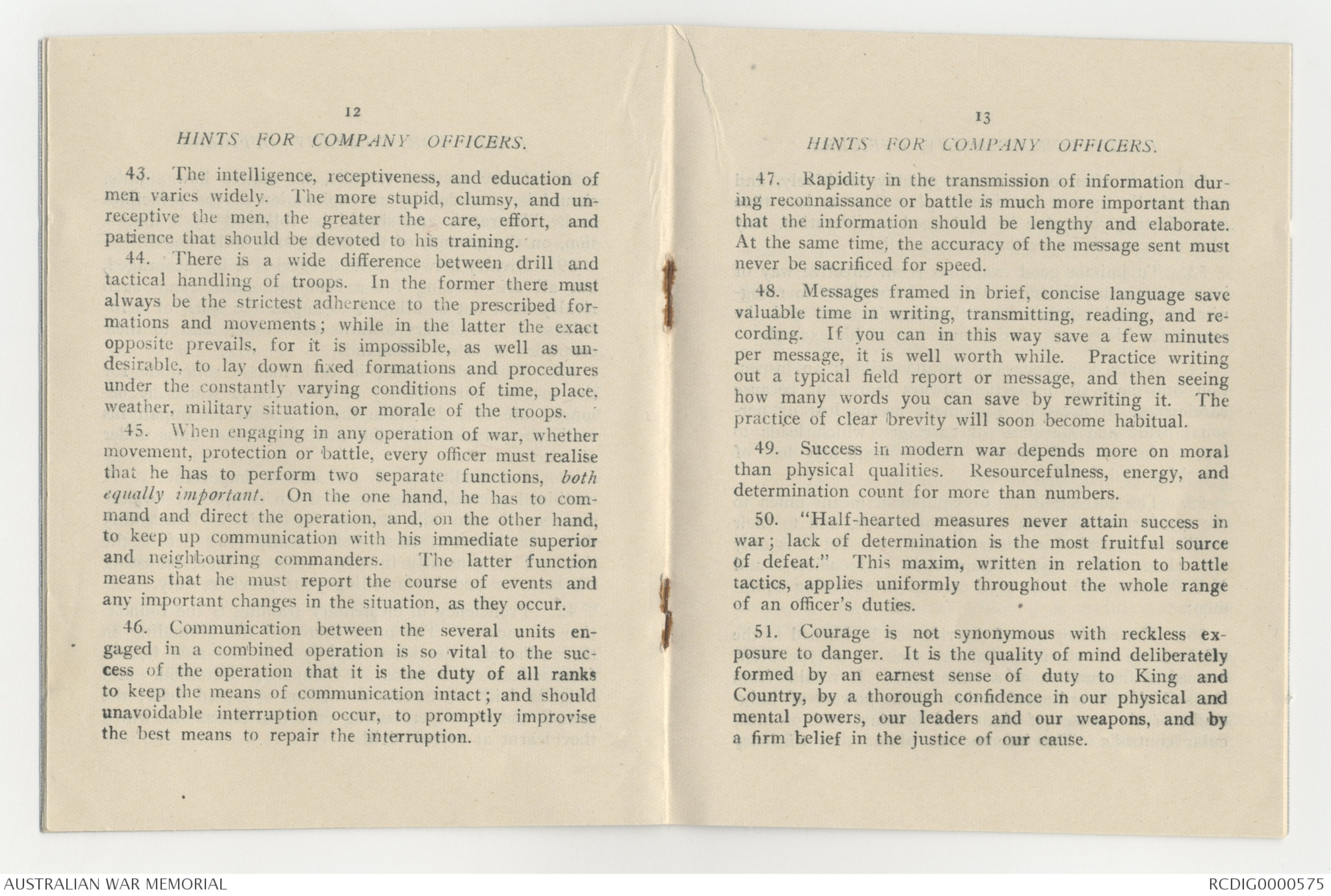
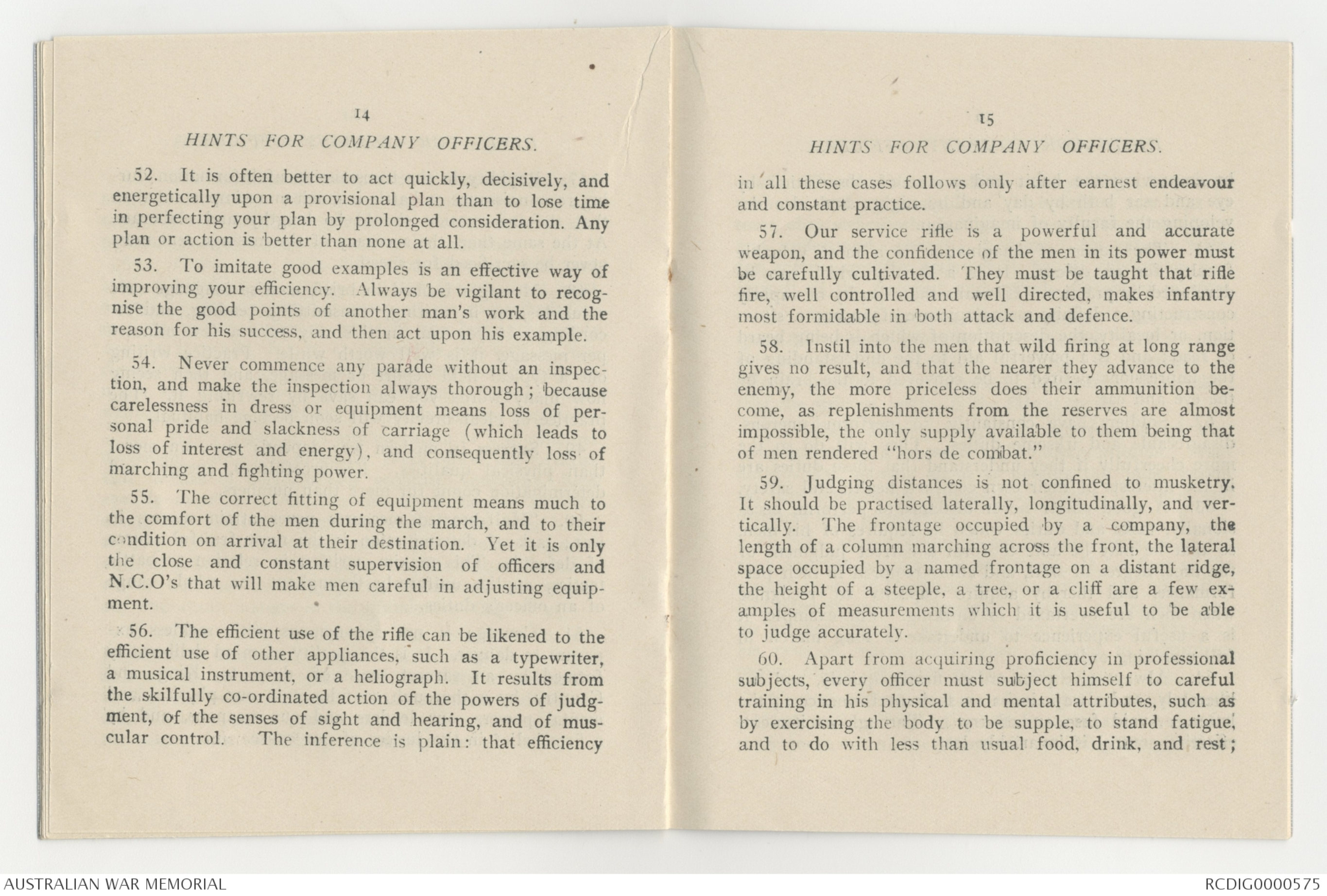
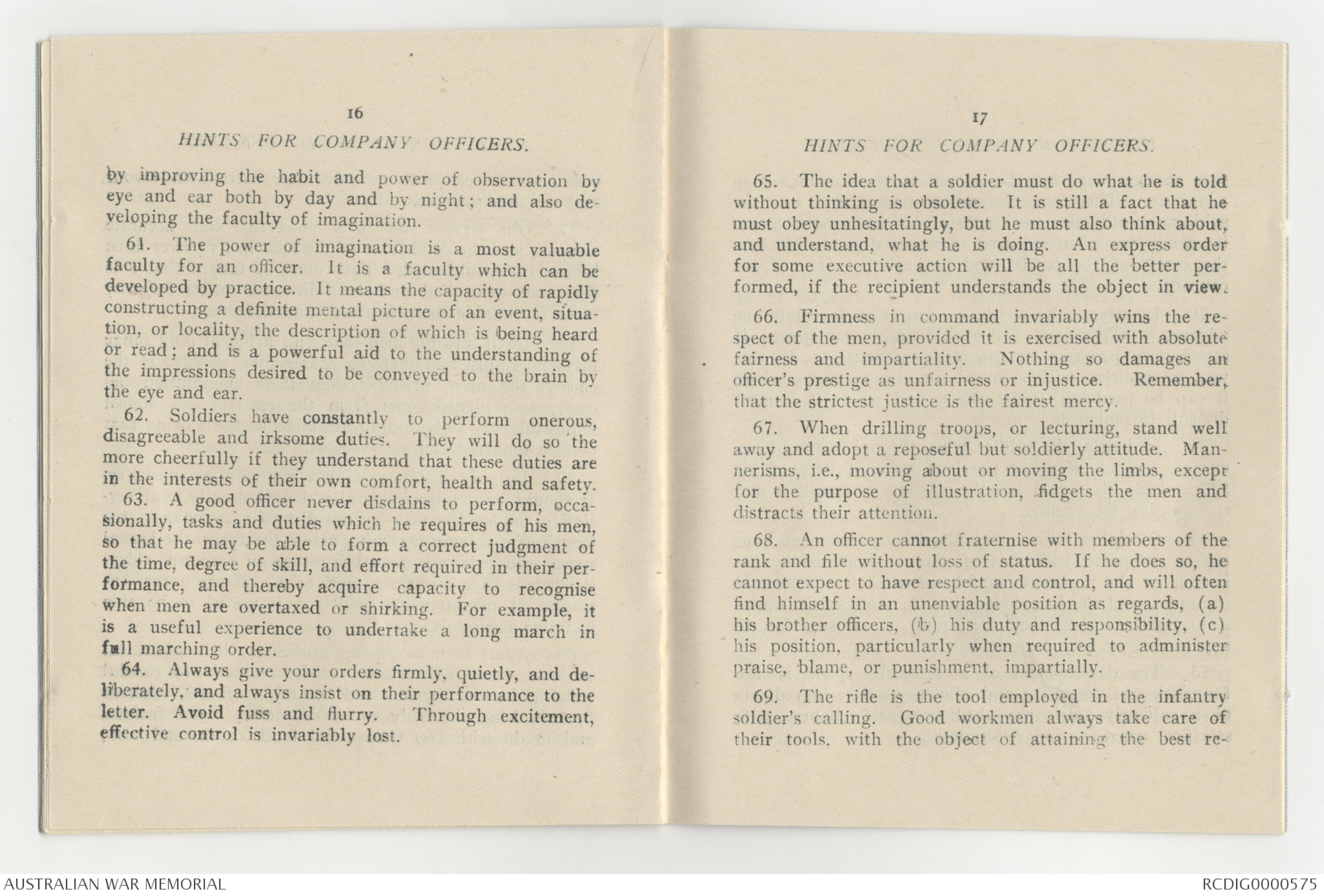
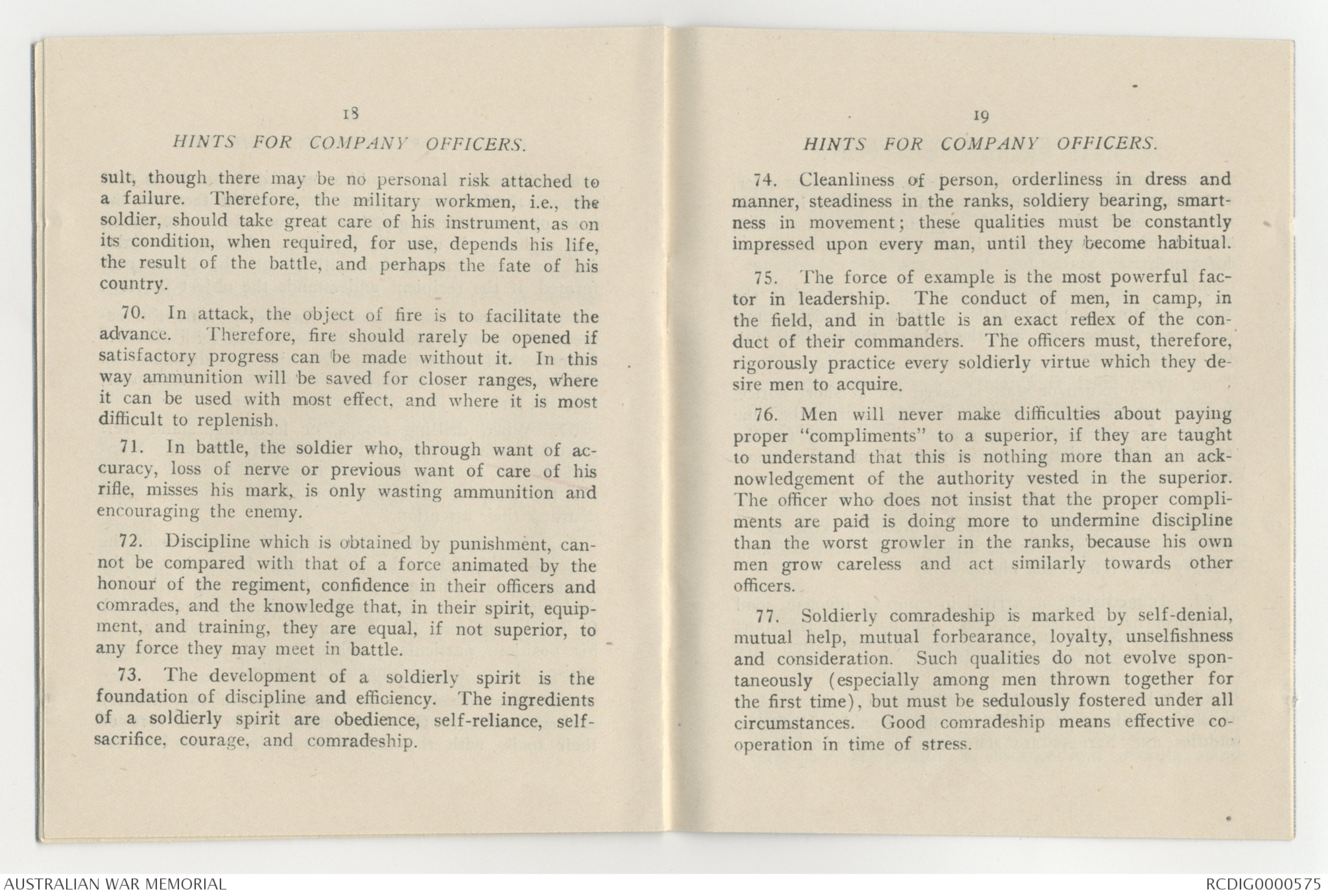
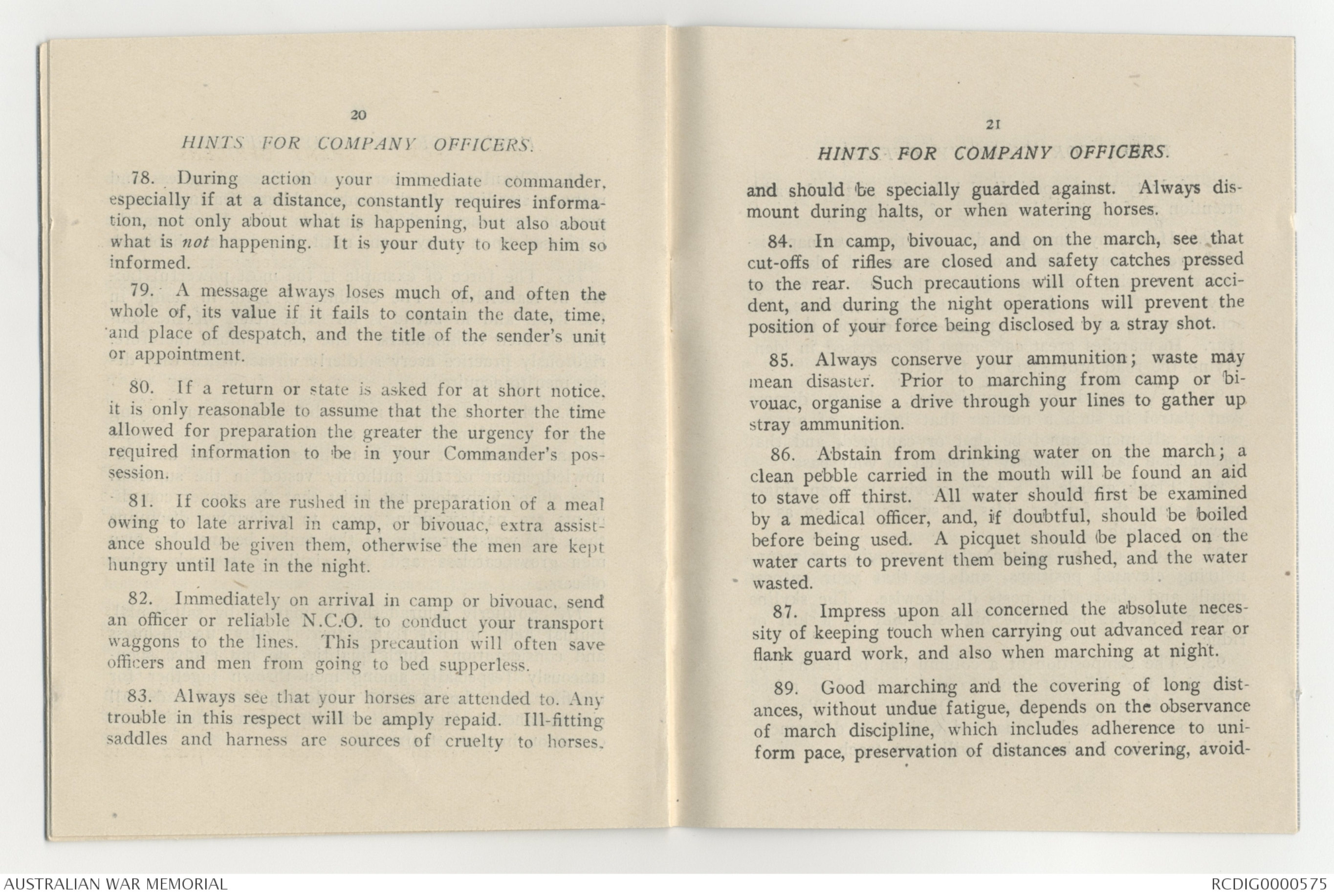
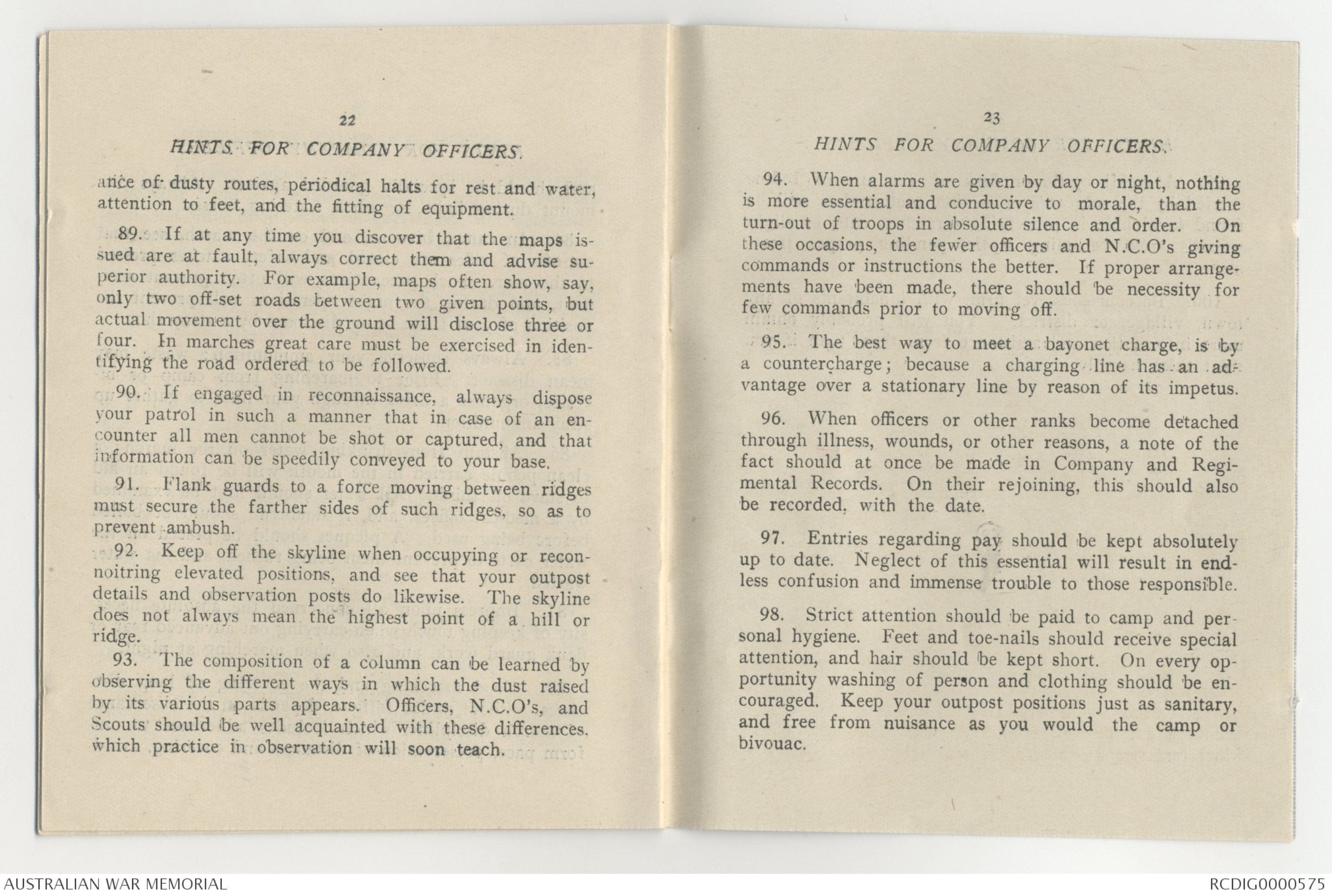
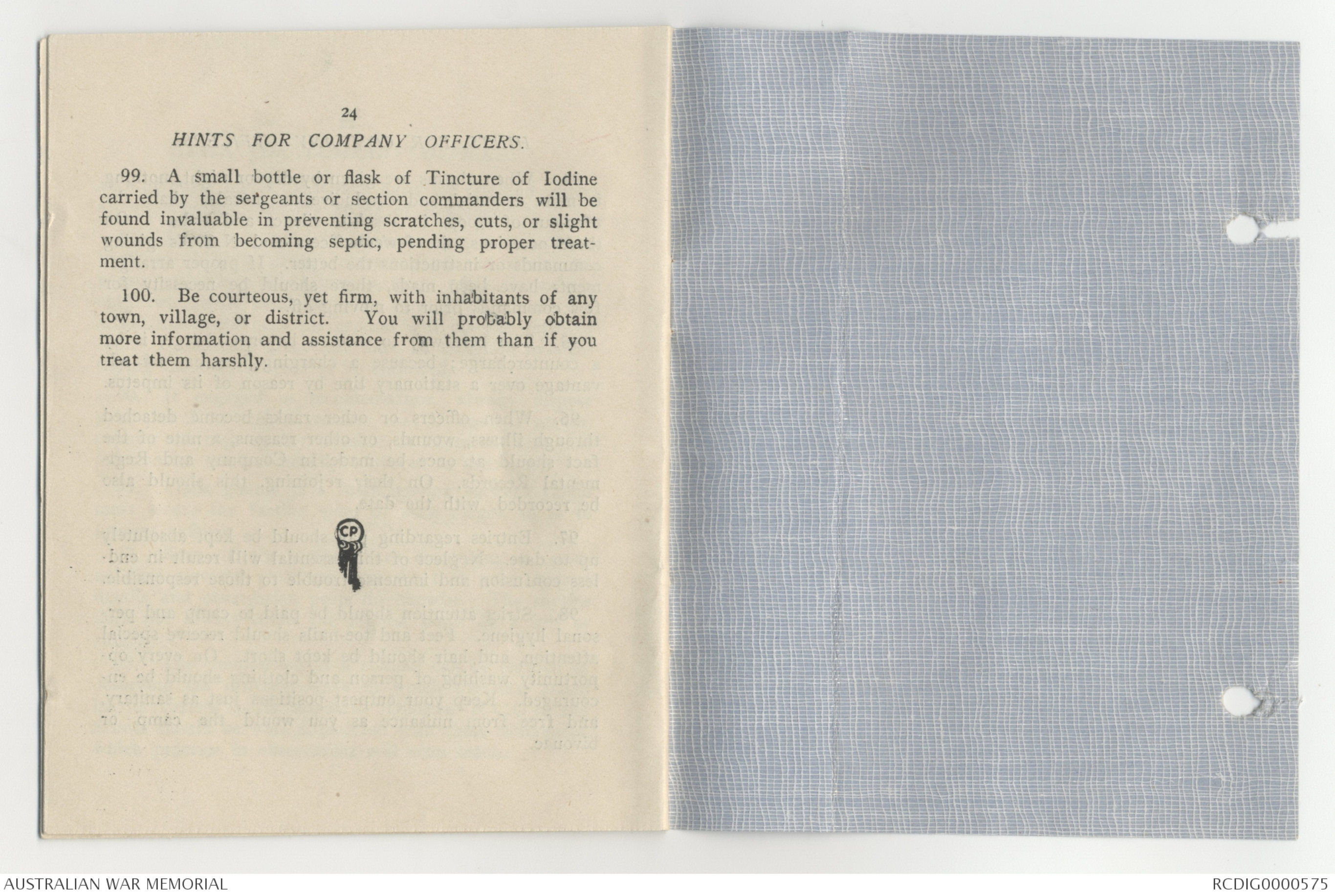
8
HINTS FOR COMPANY OFFICERS.
(b) No principle of tactics is violated;
(c) The intention of your commander is not inter¬
fered with.
If it is proved unsound, it is better to ind that out
during peace, and besides, experience has been gained.
26. It is seldom realised that much of a soldier's
efficiency depends on pure manual dexterity, that is,
his capacity to handle skilfully, accurately, and rapidly
the weapons and appliances which he has to employ.
Such dexterity can be acquired only by long sustained
and oft repeated practice.
27. To get men interested is the sure way of attain-
ing an effective and intelligent performance of their
duties. Monotonous repetition never achieves a result
other than a mechanical one. If, during instruction,
the men's interest is waning, change the subject at once.
You can later return to the original theme, with better
result.
28. If you constantly tell men that they are awkward
and useless they will become so, because even the keenest
will give up trying. On the other hand, indiscriminate
or constant praise tends to make men disregard many
details which are essential in order to maintain a
standard.
29. Men who are proud of themselves are proud
of their unit. The estimate of the spirit of a regiment
9
HINTS FOR COMPANY OFFICERS.
is better gauged by the carriage, turn-out, and actions
of its members while off duty, than by a formal inspec¬
tion on parade.
30. Economise training time in every possible way.
Teach your unit to assemble punctually and tell-off
rapidly. Be severe on men who straggle on parade late,
because this seriously curtails the time available for
training. Move off for work as soon as possible after
the time named.
31. Whenever men are resting, or waiting under
cover, during field exercises, use the time to have them
instructed in some branch of their training.
32. Ability to find the way by night, especially
across country, with and without previous daylight re-
connaissance, with and without the aid of map or com-
pass, is a most useful accomplishment for every officer,
This should be practised whenever opportunity offers.
33. As a preparation for night operations, men should
be taken out at night, at first in small, and later in
larger parties; at first on familiar and later on strange
ground; to accustom them to move about in the dark-
ness, and to train the eye to recognise stationary and
moving objects, and the ear to recognise the direction
and distance of sounds.
34. In camp or bivouac, the constant presence of
officers in the men's lines, while they are off duty, is un-
10
HINTS FOR COMPANY OFFICERS.
desirable, as it puts a restraint on the men. On the other
hand, on service, in action, in trenches, or in stress, the
presence of the offcers is a great factor in keeping up the
men's spirits, when they see that their offcers are no
better off than themselves, but are still cheerful, en-
ergetic, and sanguine of success.
35. Noise in the lines between Lights Out and Re
veille is a serious offence. It springs from a reckless
and selnsh disregard for the well-being of tired men
who want to sleep. Deal severely with disobedience of
this instruction, and see that your orderly sergeant and
corporal are insistent. It should be a point of honour
with every company offcer that his company does not
offend in this respect.
36. The ability to lecture or teach without elaborate
notes is rapidly acquired with practice. Continual re-
ferences to notes distract the class and destroy attention;
while a lecture written out in extenso and read to the
class is next to useless. If you require notes, let them
be as few as possible and consult them openly and de-
liberately (not surreptitiously) during pauses in your
remarks, and not while actually speaking.
37. Never undertake the giving of any lesson, or
piece of instruction, unless you have beforehand thought
out what you are going to teach, and have made a
plan (in your mind or on paper) of the main headings
and sub-headings of your subject.
11
HINTS FOR COMPANY OFFICERS.
38. Every tactical exercise, no matter how simple,
should be preceded by an explanation of the principles
to be illustrated, and should be followed by a discus-
sion, on the ground, of the merits and faults noted.
39. Rivalry between units to excel is to be encouraged,
but all are working for a common cause, and such
rivalry must not be allowed to impair the spirit of help-
fulness of all officers towards each other, and to their
comrades of other commands.
40. While developing in each man a solicitude for
the success and efficiency of the unit to which he be-
longs, care must be taken that this does not impair his
ready co-operation with the men of all other units under
all circumstances.
41. Punctuality is of the utmost importance. A
combined operation may break down completely because
some small unit fails to come up to time. Punctuality
does not however, mean being ready long before the
time. This generally involves waste of time, harassing
the men, or unduly curtailing your previous duty.
42. Proficiency in elementary training is the founda-
ton of success. The more thorough the grounding in
the rudiments, the more rapidly will the men benefit
from advanced training. Company, Battalion, and
Brigade drill are merely extensions of squad drill; the
men in the ranks performing only the movements which
they learnt at recruit drill.
12
HINTS FOR COMPANY OFFICERS.
43. The intelligence, receptiveness, and education of
men varies widely. The more stupid, clumsy, and un-
receptive the men, the greater, the care, effort, and
patience that should be devoted to his training.
44. There is a wide difference between drill and
tactical handling of troops. In the former there must
always be the strictest adherence to the prescribed for-
mations and movements; while in the latter the exact
opposite prevails, for it is impossible, as well as un-
desirable, to lay down fixed formations and procedures
under the constantly varying conditions of time, place,
weather, military situation, or morale of the troops.
43. When engaging in any operation of war, whether
movement, protection or battle, every offcer must realise
that he has to perform two separate funchions, both
equally important. On the one hand, he has to com-
mand and direct the operation, and, on the other hand,
to keep up communication with his immediate superior
and neighbouring commanders. The latter functon
means that he must report the course of events and
any important changes in the situation, as they occur.
46. Communication between the several units en-
gaged in a combined operation is so vital to the suc-
cess of the operation that it is the duty of all ranks
to keep the means of communication intact; and should
unavoidable interruption occur, to promptly improvise
the best means to repair the interruption.
13
HINTS FOR COMPANY OFFICERS.
47. Rapidity in the transmission of information dur-
ing reconnaissance or battle is much more important than
that the information should be lengthy and elaborate.
At the same time, the accuracy of the message sent must
never be sacrificed for speed.
48. Messages framed in brief, concise language save
valuable time in writing, transmitting, reading, and re-
cording. If you can in this way save a few minutes
per message, it is well worth while. Practice writing
out a typical feld report or message, and then seeing
how many words you can save by rewriting it. The
practice of clear brevity will soon become habitual.
49. Success in modern war depends more on moral
than physical qualities. Resourcefulness, energy, and
determination count for more than numbers.
50. "Half-hearted measures never attain success in
war; lack of determination is the most fruitful source
of defeat." This maxim, written in relation to battle
tactics, applies uniformly throughout the whole range
of an officer's duties.
51. Courage is not synonymous with reckless ex-
posure to danger. It is the quality of mind deliberately
formed by an earnest sense of duty to King and
Country, by a thorough confidence in our physical and
mental powers, our leaders and our weapons, and by
a firm belief in the justice of our cause.
14
HINTS FOR COMPANY OFFICERS.
52. It is often better to act quickly, decisively, and
energetically upon a provisional plan than to lose time
in perfecting your plan by prolonged consideration. Any
plan or action is better than none at all.
53. To imitate good examples is an effective way of
improving your efficiency. Always be vigilant to recog-
nise the good points of another man's work and the
reason for his success, and then act upon his example.
54. Never commence any parade without an inspec-
tion, and make the inspection always thorough; because
carelessness in dress or equipment means loss of per-
sonal pride and slackness of carriage (which leads to
loss of interest and energy), and consequently loss of
marching and fighting power.
55. The correct fitting of equipment means much to
the comfort of the men during the march, and to their
condition on arrival at their destination. Yet it is only
the close and constant supervision of officers and
N.C.O's that will make men careful in adjusting equip-
ment.
56. The efficient use of the rifle can be likened to the
efficient use of other appliances, such as a typewriter,
a musical instrument, or a heliograph. It results from
the skilfully co-ordinated action of the powers of judg-
ment, of the senses of sight and hearing, and of mus-
cular control. The inference is plain: that efficiency
15
HINTS FOR COMPANY OFFICERS.
in all these cases follows only after earnest endeavour
and constant practice.
57. Our service rifle is a powerful and accurate
weapon, and the confidence of the men in its power must
be carefully cultivated. They must be taught that rifle
fire, well controlled and well directed, makes infantry
most formidable in both attack and defence.
58. Instil into the men that wild firing at long range
gives no result, and that the nearer they advance to the
enemy, the more priceless does their ammunition be-
come, as replenishments from the reserves are almost
impossible, the only supply available to them being that
of men rendered "hors de combat."
59. Judging distances is not confined to musketry.
It should be practised laterally, longitudinally, and ver-
tically. The frontage occupied by a company, the
length of a column marching across the front, the lateral
space occupied by a named frontage on a distant ridge,
the height of a steeple, a tree, or a cliff are a few ex-
amples of measurements which it is useful to be able
to judge accurately.
60. Apart from acquiring proficiency in professional
subjects, every officer must subject himself to careful
training in his physical and mental attributes, such as
by exercising the body to be supple, to stand fatigue,
and to do with less than usual food, drink, and rest;
16
HINTS FOR COMPANY OFFICERS.
by improving the habit and power of observation by
eye and ear both by day and by night; and also de-
veloping the faculty of imagination.
61. The power of imagination is a most valuable
faculty for an oficer. It is a faculty which can be
developed by practice. It means the capacity of rapidly
constructing a definite mental picture of an event, situa-
tion, or locality, the description of which is being heard
or read; and is a powerful aid to the understanding of
the impressions desired to be conveyed to the brain by
the eye and ear.
62. Soldiers have constantly to perform onerous,
disagreeable and irksome duties. They will do so the
more cheerfully if they understand that these duties are
in the interests of their own comfort, health and safety.
63. A good officer never disdains to perform, occa-
sionally, tasks and duties which he requires of his men,
so that he may be able to form a correct judgment of
the time, degree of skill, and effort required in their per-
formance, and thereby acquire capacity to recognise
when men are overtaxed or shirking. For example, i
is a useful experience to undertake a long march in
full marching order.
64. Always give your orders firmly, quietly, and de-
liberately, and always insist on their performance to the
letter. Avoid fuss and flurry. Through excitement,
effective control is invariably lost.
17
HINTS FOR COMPANY OFFICERS.
65. The idea that a soldier must do what he is told
without thinking is obsolete. It is still a fact that he
must obey unhesitatingly, but he must also think about,
and understand, what he is doing. An express order
for some executive action will be all the better per-
formed, if the recipient understands the object in view.
66. Firmness in command invariably wins the re-
spect of the men, provided it is exercised with absolute
fairness and impartiality. Nothing so damages an
officer's prestige as unfairness or injustice. Remember,
that the strictest justice is the fairest mercy.
67. When drilling troops, or lecturing, stand well
away and adopt a reposeful but soldierly attitude. Man-
nerisms, i.e., moving about or moving the limbs, except
for the purpose of illustration, fidgets the men and
distracts their attention.
68. An officer cannot fraternise with members of the
rank and file without loss of status. If he does so, he
cannot expect to have respect and control, and will often
find himself in an unenviable position as regards, (a)
his brother officers, (b) his duty and responsibility, (c)
his position, particularly when required to administer
praise, blame, or punishment, impartially.
69. The rifle is the tool employed in the infantry
soldier's calling. Good workmen always take care of
their tools, with the object of attaining the best re-
18
HINTS FOR COMPANY OFFICERS.
sult, though there may be no personal risk attached to
a failure. Therefore, the military workmen, i.e., the
soldier, should take great care of his instrument, as on
it condition, when required, for use, depends his life,
the result of the battle, and perhaps the fate of his
country.
70. In attack, the object of fire is to facilitate the
advance. Therefore, fre should rarely be opened if
satisfactory progress can be made without it. In this
way ammunition will be saved for closer ranges, where
it can be used with most effect, and where it is most
difficult to replenish.
71. In battle, the soldier who, through want of ac-
curacy, loss of nerve or previous want of care of his
rifle, misses his mark, is only wasting ammunition and
encouraging the enemy.
72. Discipline which is obtained by punishment, can-
not be compared with that of a force animated by the
honour of the regiment, confidence in their officers and
comrades, and the knowledge that, in their spirit, equip-
ment and training, they are equal, if not superior, to
any force they may meet in battle.
73. The development of a soldierly spinit is the
foundation of discipline and efficiency. The ingredients
of a soldierly spirit are obedience, self-reliance, self-
sacrifce, courage, and comradeship.
19
HINTS FOR COMPANY OFFICERS.
74. Cleanliness of person, orderliness in dress and
manner, steadiness in the ranks, soldiery bearing, smart-
ness in movement; these qualities must be constantly
impressed upon every man, until they become habitual.
75. The force of example is the most powerful fac-
tor in leadership. The conduct of men, in camp, in
the field, and in battle is an exact reflex of the con-
duct of their commanders. The officers must, therefore,
rigorously practice every soldierly virtue which they de-
sire men to acquire.
76. Men will never make difficulties about paying
proper "compliments" to a superior, if they are taught
to understand that this is nothing more than an ack-
nowledgement of the authority vested in the superior.
The offcer who does not insist that the proper compli-
ments are paid is doing more to undermine discipline
than the worst growler in the ranks, because his own
men grow careless and act similarly towards other
offcers.
77. Soldierly comradeship is marked by self-denial,
mutual help, mutual forbearance, loyalty, unselfishness
and consideration. Such qualities do not evolve spon-
taneously (especially among men thrown together for
the frst time), but must be sedulously fostered under all
circumstances. Good comradeship means efective co-
operation in tme of stress.
20
HINTS FOR COMPANY OFFICERS.
78. During action your immediate commander,
especially if at a distance, constantly requires informa-
tion, not only about what is happening, but also about
what is not happening. It is your duty to keep him so
informed.
79. A message always loses much of, and often the
whole of, its value if it fails to contain the date, time,
and place of despatch, and the title of the sender's unit
or appointment.
80. If a return or state is asked for at short notice.
it is only reasonable to assume that the shorter the time
allowed for preparation the greater the urgency for the
required information to be in your Commander's pos-
session.
81. If cooks are rushed in the preparation of a meal
owing to late arrival in camp, or bivouac, extra assist-
ance should be given them, otherwise the men are kept
hungry until late in the night.
82. Immediately on arrival in camp or bivouac, send
an oficer or reliable N.C.O. to conduct your transport
waggons to the lines. This precaution will often save
officers and men from going to bed supperless.
83. Always see that your horses are attended to. Any
trouble in this respect will be amply repaid. Ill-ftting
saddles and harness are sources of cruelty to horses.
21
HINTS FOR COMPANY OFFICERS.
and should be specially guarded against. Always dis-
mount during halts, or when watering horses.
84. In camp, bivouac, and on the march, see that
cut-offs of rifles are closed and safety catches pressed
to the rear. Such precautions will often prevent acci-
dent, and during the night operations will prevent the
position of your force being disclosed by a stray shot.
85. Always conserve your ammuniton; waste may
mean disaster. Prior to marching from camp or bi-
vouac, organise a drive through your lines to gather up
stray ammuniton.
86. Abstain from drinking water on the march; a
clean pebble carried in the mouth will be found an aid
to stave off thirst. All water should first be examined
by a medical officer, and, if doubtful, should be boiled
before being used. A picquet should be placed on the
water carts to prevent them being rushed, and the water
wasted.
87. Impress upon all concerned the absolute neces-
sity of keeping touch when carrying out advanced rear or
flank guard work, and also when marching at night.
89. Good marching and the covering of long dist-
ances, without undue fatigue, depends on the observance
of march discipline, which includes adherence to uni-
form pace, preservation of distances and covering, avoid-
22
HINTS FOR COMPANY OFFICERS.
ance of dusty routes, periodical halts for rest and water,
attention to feet, and the fitting of equipment.
89. If at any time you discover that the maps is-
sued are at fault, always correct them and advise su-
perior authority. For example, maps often show, say,
only two off-set roads between two given points, but
actual movement over the ground will disclose three or
four. In marches great care muust be exercised in iden-
tifying the road ordered to be followed.
90. If engaged in reconnaissance, always dispose
your patrol in such a manner that in case of an en-
counter all men cannot be shot or captured, and that
information can be speedily conveyed to your base.
91. Flank guards to a force moving between ridges
must secure the farther sides of such ridges, so as to
prevent ambush.
92. Keep of the skyline when occupying or recon-
noitring elevated positions, and see that your outpost
details and observation posts do likewise. The skyline
does not always mean the highest point of a hill or
ridge.
93. The composition of a column can be learned by
observing the different ways in which the dust raised
by its various parts appears. Officers, N.C.O's, and
Scouts should be well acquainted with these differences.
which practice in observation will soon teach.
23
HINTS FOR COMPANY OFFICERS.
94. When alarms are given by day or night, nothing
is more essential and conducive to morale, than the
turn-out of troops in absolute silence and order. On
thee occasions, the fewer officers and N.C.O's giving
commands or instructions the better. If proper arrange-
ments have been made, there should be necessity for
few commands prior to moving off.
95. The best way to meet a bayonet charge, is by
a countercharge; because a charging line has an ad-
vantage over a stationary line by reason of its impetus.
96. When officers or other ranks become detached
through illness, wounds, or other reasons, a note of the
fact should at once be made in Company and Regi-
mental Records. On their rejoining, this should also
be recorded, with the date.
97. Entries regarding pay should be kept absolutely
up to date. Neglect of this essential will result in end-
less confusion and immense trouble to those responsible.
98. Strict attention should be paid to camp and per-
sonal hygiene. Feet and toe-nails should receive special
attention, and hair should be kept short. On every op-
portunity washing of person and clothing should be en-
couraged. Keep your outpost positions just as sanitary,
and free from nuisance as you would the camp on
bivouac.
24
HINTS FOR COMPANY OFFICERS.
99. A small bottle or flask of Tincture of Iodine
carried by the sergeants or section commanders will be
found invaluable in preventing scratches, cuts, or slight
wounds from becoming septic, pending proper treat-
ment.
100. Be courteous, yet firm, with inhabitants of any
town, village, or district. You will probably obtain
more information and assistance from them than if you
treat them harshly.
CP
 Jacqueline Kennedy
Jacqueline KennedyThis transcription item is now locked to you for editing. To release the lock either Save your changes or Cancel.
This lock will be automatically released after 60 minutes of inactivity.